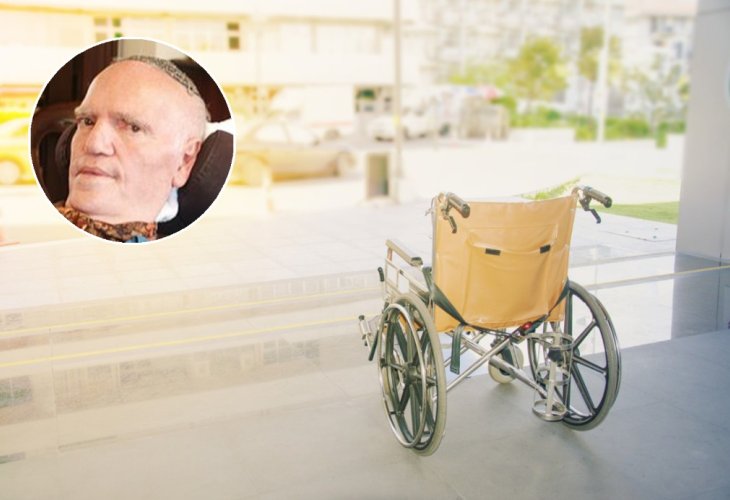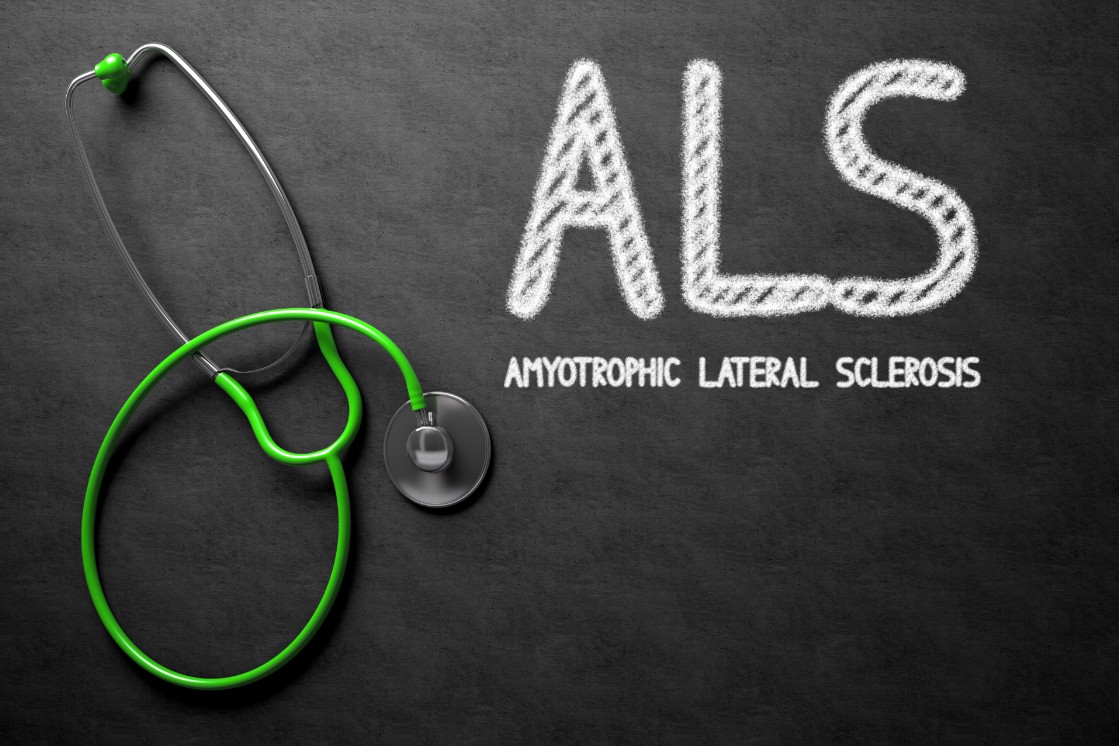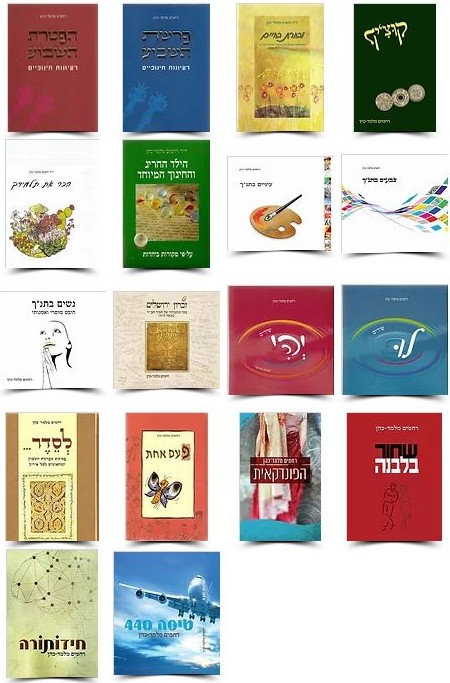Rachamim Melamed-Cohen: Paralyzed for Over 20 Years and Enjoying Every Day Afresh
When he was diagnosed with ALS, doctors gave him no more than 5 years to live. Yet, Dr. Rachamim Melamed-Cohen continues to live, create, and find joy, fully paralyzed and connected to a respirator, feeding machine, suction machine, and more. An inspiring exclusive interview.
 (Photo: shutterstock)
(Photo: shutterstock)"I live an interesting, quality, valuable, and beautiful life," writes Dr. Rachamim Melamed-Cohen in response to my question about his quality of life. Today, amidst the hours he dedicates to studying Torah and visiting family and friends, Melamed-Cohen also manages to progress in writing his books and answering the many emails he receives from throughout the country and the world. Over the years, he has published 18 books, showcased his paintings in major exhibitions, and lectured to diverse audiences. All this while being completely paralyzed from head to toe for over two decades. He's connected to a respirator, a feeding machine, a suction machine, and more. Yet through his eyes, the only part he can still move, he continues to build, create, and yes, enjoy every day anew.
 (Photo: shutterstock)
(Photo: shutterstock)
A Life of Giving
Dr. Rachamim Melamed-Cohen was born 83 years ago in the Mahane Yehuda neighborhood of Jerusalem and named after his grandfather, who was the rabbi of the Jewish Shiraz community in Persia and later also the rabbi of Persian exiles in Jerusalem. His father, Rabbi Yaakov, was also a leader of this community and was honored as 'Yakir Yerushalayim' for his great care for children with special needs.
It seems the apple does not fall far from the tree, as Rachamim's broad and loving heart was evident from a young age. During the War of Independence, he volunteered to teach Hebrew to new immigrants in the Jerusalem corridor settlements and also worked to establish an 'Ezra' branch for immigrant children in one of these communities.
Melamed-Cohen later pursued teaching studies and immediately after completing them, took over a particularly "energetic" 6th-grade class. "The children called me Rachamim," he recounts. "One day the principal came in and said, 'It's not right for the children to call you Rachamim; they should address you in the third person—Teacher, Your Honor, Sir.' So I told the students, 'Did you hear what the principal said? Please adhere to this,' and the jokers sat and wrote me a letter in the third person—'To Our Dear Teacher...' I read the letter and then announced to them, 'Go back and call me Rachamim, but keep me alive.'" This teacher, with his great skill and love for his students, managed to maintain the vibrant class and continued to educate its students for the next two years. But a person with such a large heart could not stop there. The strong bond he created with his students did not cease, and they continued to meet with him almost every month for decades to come. Many of these young people, who became senior officials, still come to watch over their teacher at night.
At the end of this teaching period, Rachamim went with his wife Elisheba and two children on a four-year educational mission to India, and upon returning to Israel, he was appointed as one of the youngest inspectors of schools in religious education. Later, there was also a two-year mission to London, which included responsibility for dozens of Jewish schools and centers, and finally—the highlight on which he spent decades was supervising special education frameworks. Upon his initiative, therapeutic classes, tailored schools, and curricula for children with disabilities were established nationwide. He dedicated his second and third degrees to this subject and even opened the special education department at a Jerusalem college, which he headed for 20 years.
 (Photo: shutterstock)
(Photo: shutterstock)
A Fly on the Nose
In 1994, at age 57, happily married to his wife and father of six children, a turning point occurred. "Once, I visited my sister in the settlement of Beit El, and while walking, I tripped and fell for no reason. Then the left shoulder began to weaken, and during Shabbat kiddush, my hand trembled and the wine spilled from the cup," he writes. "One day, I rolled down the stairs of the Ministry of Education. My left leg stopped obeying my commands. One day I fell on my back and lay on the sidewalk like a bug on its back, unable to get up until a kind person helped me rise."
The repeated falls began raising questions, and Rachamim and his wife Elisheba embarked on a journey of inquiries to understand the situation. Initially, doctors thought he had a mild inflammation, then perhaps a herniated disc. But then the couple reached Professor Gadot, head of the neurology ward at 'Meir' Hospital in Kfar Saba, who informed them of the ALS disease that was residing in Rachamim's body. "This disease," the professor explained, "will initially paralyze his limbs, then the neck and mouth muscles, and eventually also the lungs. 'A day will come when a fly will land on your nose and you won't be able to shoo it away,'" he said, adding, "You have three to five years to live; make the most of your time."
"Elisheba burst into tears, I received the news with composure and immediately began planning the remaining time. I gathered my close family and told them, they wept," he writes. From there, the couple moved between tests and treatments, not skipping whom Melamed-Cohen considered "a waste of time, money, and support for fraudulent and evil forces," as he put it. After those failed attempts at healing, he was left with one conclusion: "I decided to maintain direct contact with Hashem. The sages say: 'Anyone who prays for his friend is answered first,' so I sat down and composed a poem requesting healing from the Creator for all the sick."
Master of the Universe / Creator of the cosmos
Unfathomable world / Maker of light, earth, and man
Your glory fills the world / You do everything from the heavens
Pulling strings / Peace and war / Justice. Kindness. Mercy.
The great, mighty, and revered God / Bestows salvation and deliverance upon Your creations
Who grants a person wisdom, understanding, and knowledge.
Find solace and healing / Send a wise and skilled healer
To remove suffering and pain from every sick and aching person / Please, from the heart.
For Your name / For Your sake / For our sake / Answer us
For You are the shepherd / We are the sheep / Open for us the gates of goodwill
And a complete recovery / Request
("Request," from the book "Yehi")
![(Photo: Shutterstock)]() (Photo: Shutterstock)
(Photo: Shutterstock)
 (Photo: Shutterstock)
(Photo: Shutterstock)
"The Peak of My Life's Work"
Where does the strength to live joyfully and not fall come from, given that it's almost inhuman in your situation?
"Every crisis is a lever for elevation towards the heavens; I received my optimism from my father," he writes slowly, letter by letter, with his eyes.
Nonetheless, I wonder, how can one remain optimistic when confined within a paralyzed body for more than 20 years? The explanation for this state can be found in previous statements: "People don't believe me when I honestly say these are the best years of my life. My talents and thoughts, once hidden, have erupted in the form of 18 books, 8 art exhibitions, and 10 songs composed—all through eye movements on a computer screen. The satisfaction is immense, especially when the surrounding reactions are positive. Although I miss hugging my loved ones, eating and drinking through my mouth, hiking in the mountains, and breathing without a respirator, considering the doctors' prognosis that I would live 3-5 years, I am happy to still be alive."
Moreover, he adds, "I breathe with the help of the machine, perform suction (saliva removal) every few minutes, and in my heart, despite my circumstances, I say: 'How great are Thy works, O Lord.' I know some might say 'woe if the Lord causes such an illness,' but I write what I feel and think, perhaps irrationally, but out of habit, upbringing, love, joy, and faith in the Rock of Israel and its Redeemer." Remarkable.
Indeed, every day in Melamed-Cohen's life is utilized to the fullest. When asked about his daily routine, he responds: "At seven in the morning, hygiene activities and a shower; at nine, morning prayers; at ten, study. At noon, I answer emails on the computer; at one, I write books; at six in the evening, I listen to the news; at nine, study with my son Rambam or Gemara." He does not forgo the ritual of washing hands, although his hands have been paralyzed for years, and a friend helps him don the prayer shawl and tefillin daily.
Not only that, instead of being despondent about his life and longing for his final day, he began, over time, to make agreements with Hashem about his lifespan. Initially, he requested to see his son marry, then his second daughter’s wedding, and since then, "At every joyous occasion, I make a new agreement with Hashem for the next joy," he writes. The festivities, thank God, come one after another after being blessed with dozens of grandchildren and great-grandchildren. Moreover, his connection with his entire family not only remains strong but has intensified. "They are wonderful," he writes about his descendants, "I believe my condition has tightened the ties with the children, grandchildren, and great-grandchildren. Many of them wrote school papers about me." It seems that the grandfather who showered warmth and love early on has been receiving it during his illness from all those around him.
What fills your life with meaning?
"Creation and learning with the sons and daughters," blinks the eyes, letter by letter.
Today, Rachamim "celebrates" 24 years of living with the disease. Three of the doctors who then determined his life expectancy have long passed away, yet he continues to live, create, and write during what he calls "the peak of my life’s work."
A Messenger of the Community
"Everyone calls him Lulu / Because he always says no no…
Once, in a moment of favor / Lulu sat on my knees
I charmed him with humor / The toddler replied: Grandpa, enough!
And added naively / Grandpa, so when will you die?
Dear child / I, his father's father / I imitated him
I answered him Lululu / Don’t want to, don’t want to, don’t want to!
Lulu pointed at me and laughed out loud / Grandpa no no, Grandpa no no!
("Don’t Want to," from the book "Yehi")

But not only the innocent grandson asked his grandfather when he would pass away. About five years after falling ill, Melamed-Cohen began to choke, lost consciousness, and was rushed to the hospital. Elisheba called an ambulance, and while her husband floated between heaven and earth, a doctor asked her why she even bothered calling for help. Nonetheless, Melamed-Cohen proved once again that the effort was worthwhile, "I decided that life is too beautiful to give up," he writes. 21 years have passed since then.
What do you have to say about the attitude of the doctors towards you as a terminal patient?
"A professor from 'Hadassah' claims that life is in human hands, and I pray every morning: 'My God, the soul you gave me is pure... and You are destined to take it from me.'"
And what about the known concept of 'euthanasia,' which, as some say, can 'redeem you from your suffering'?
"I am at the helm against euthanasia. There are technical and medical means that assist even terminal patients. According to the sages, 'even if a sharp sword rests on a person's neck, they should not lose hope for mercy.'"
So not only did the illness not defeat him, but at every stage of his disease, Melamed-Cohen began preparing for the next stage. He ordered an elevator before it was needed, researched about peg surgery while still able to eat and drink through his mouth. While still able to speak clearly, he investigated and found a computer program that allows use through eye movements. Initially, using the program was not easy. "For three months, I practiced consistently, persistently, and despite frustrations, overcame obstacles and beamed with joy when my lecture came from under my eyes," he writes. This lecture on ALS was delivered to doctors via software translating writing into speech, "Questions and answers, the satisfaction is great," he concludes.
Do you sometimes ask Hashem why he did this to you? Are you angry with him?
"Initially, I asked why did You do this to me, then I told myself I am a messenger of the community. Finally, I was pleased because I create and think in my difficult state, despite being completely paralyzed and only my eyelids moving."
Indeed, as someone who sees himself as a community messenger, despite the physical limitation, Melamed-Cohen is still on the giving side. "Many people have declared to me that I changed their outlook on life. Even the doctor told me he changed his mind about euthanasia," he writes. He especially remembers a student who came to him at the end of his lecture and told him she had thought about suicide, but after hearing his words, realized she had a reason to continue living.
Taking Flight on Eyelids
"My body, a tool / Does not move or budge / Almost / I have none.
It's a shame / But / Living waters / Flow / Bubble
A burgeoning spring / Within me
Abundance / Radiant light / Pure"
("Living Waters," from the book "Yehi")
What is behind this choice to live anew every day?
"Faith in Hashem and myself, hope, love, and joy."
As someone who has lain for years without being able to move, isolated within his body, what can you say to people who, during the corona period, find themselves alone for a long time?
"Hashem gave humans wisdom, understanding, and intelligence even when confined in their homes. Clear thinking is a heavenly gift. I wish all patients in Israel full illumination and that the coronavirus will vanish from the world."

